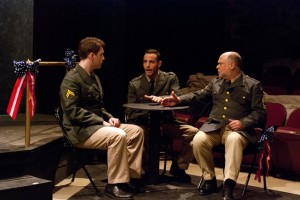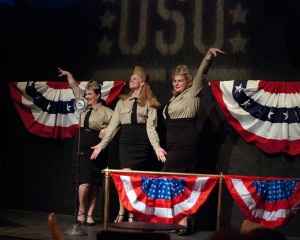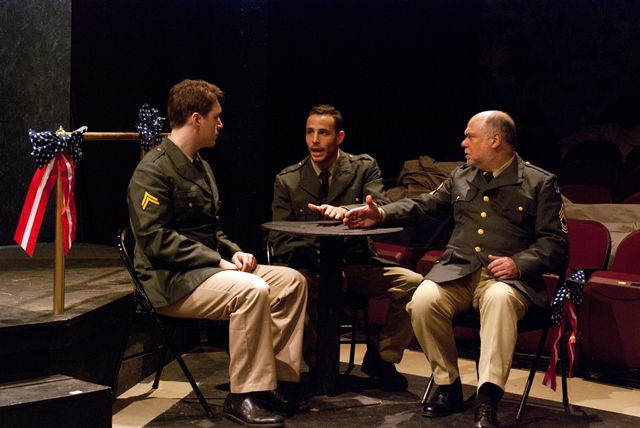In 1943, Bob Hope was hosting one of almost 200 USO performances honoring those fighting in the war. Who would have thought that at the same time, somewhere in America, Elizabethan subjects would be doing the same thing? However, instead of focusing on troubles abroad, this poetic speaking group struggled with communicating what was truly in their hearts. Love was certainly a battlefield in this war of words, Shakespearean style.

John Bergeron, Dan Gold and John Pinto are featured in MUCH ADO ABOUT NOTHING, running at Town and Country Players in Buckingham, PA through October 15.
Director DeLarme Landes noted this adaptation meant no disrespect to Shakespeare and his original vision, only a new way of interpreting his genius and sharing a fresh perspective. However, at first it felt like watching an episode of Shakespearean Sopranos as men dressed in suits discussed welcoming old friends back home. It was a little difficult to get into without a copy of CliffsNotes, until the ladies started speaking. Then I realized, it was more than just the words, it was the cadence in which they were being spoken. Shakespeare is easy to butcher, there needs to be a certain flow to the language, and each character not only has to know what he/she is saying, they have to feel it. The audience can tell the difference.
Beatrice (Cat Miller) especially had a way of sounding so natural, no matter if the scene was dramatic or comedic. Miller gave Beatrice just enough sass to make her likable and one to watch. Even Hero (Tess Ammerman) added sweetness to the more detached and stock-brokerish tones of Leonato (Jim Palmer) and the Messenger (Jon Knapp). Throughout the play, Palmer seemed a little stiff and may have forced the drama a bit too far, causing him to get so caught up in expressing emotion that he lost track of the difficult dialogue. Ammerman had plenty of chances to overdo it, whether making the doe-eyed Hero too sweet or virginal, but she showed strength in shyness which complemented the more ballsy characters well.
Surprisingly, once the soldiers showed up, their Shakespearean slang sounded a lot more believable than the dialogue from the suits. Maybe it was the military uniforms, but Don Pedro (John Pinto), Benedick (Jack Bathke), and Claudio (John Bergeron) ranked high in ease in delivering such poetic lines with just the right measure of feeling to express what was going on in their heads and hearts. Bergeron’s low booming voice stood out among the rest, and was even more impressive when he could soften it when speaking of matters of the heart. Although, some forced whimpers toward the end may have been too soft. Benedick was usually the one found talking to himself or the audience, which made him a fitting “jester,” who turned out to be horrible at rhyming. Shakespeare does love his irony.
Ironically, the law enforcement of the show acted as comic relief with Dogberry (Marie Maginity) equipped with a bat and George Seacole (Hilton Geieske) with his prestigious flashlight, joined by trusty sidekicks Verges (Giz Coughlin) and Helen Oatcake (Sarah LeClair). This bumbling group of protectors cleaned up the mean streets turning the trickery into treats.
The rest of the cast should be credited for tackling the Shakespearean tongue in a commendable way. It’s not an easy task to decipher all his words and meanings behind them, but the cast, as a whole, made it work.

Jillian Thacker Ambs, Anne Odland, Susan Fowler in a scene from Town and Country Players' rendition of MUCH ADO ABOUT NOTHING.
The USO shows of the 40s typically included popular songs of the time, and so this adaptation followed suit and opened with the same harmonic and twangy USO sound of “Don’t Sit Under the Apple Tree.” The lovely trio of Susan Fowler, Anne Odland and Jillian Thacker Ambs fit the 40’s feel from their period hairstyles, wardrobe, and jazzy rhythm. Later in Act I, the entire ensemble even broke out into a 40’s style dance off to “Boogie Woogie Bugle Boy.” Then, just as the show was coming to a close, Claudio turned his low booming voice into a sweet tenor as he crooned to “I’ll Be Seeing You,” the song that usually closed each Hope USO show as well.
The 1940s was a tumultuous time of war and pride, which makes it the perfect background for a Shakespearean story about the fight for love and truth. The same feeling of longing filled the Town and Country barn as we watched loved ones deal with loss and reunions. This adaptation not only highlighted many of the multitalented actors involved, but it showed the strong themes Shakespeare is known and loved for.
MUCH ADO ABOUT NOTHING
by William Shakespeare
Adapted and Directed by DeLarme Landes
October 1-15, 2011
Town and Country Players
4158 York Rd.
Buckingham, PA
800-838-3006
www.townandcountryplayers.org


